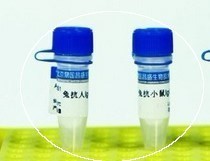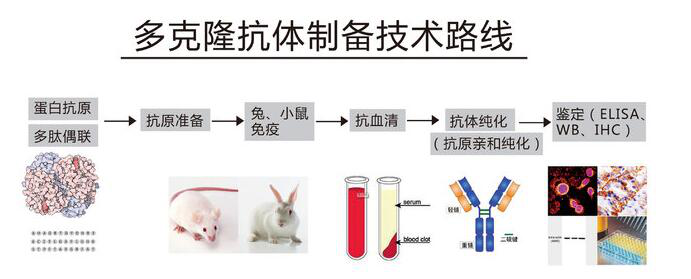
|

| 产地 | 进口、国产 |
| 品牌 | 上海莼试 |
| 保存条件 | Store at -20 °C |
| 货号 | CS10804 |
| 应用范围 | WB=1:100-500 ELISA=1:500-1000 IP=1:20-100 IHC-P=1:100-500 IHC-F=1:100-500 IF=1:100-500 |
| CAS编号 | |
| 抗体名 | Anti-PCNA-Proliferation Marker |
| 克隆性 | |
| 靶点 | 详见说明书 |
| 适应物种 | 详见说明书 |
| 形态 | 详见说明书 |
| 宿主 | 详见说明书 |
| 亚型 | IgG |
| 标识物 | 详见说明书 |
| 浓度 | 1mg/1ml% |
| 免疫原 | KLH conjugated synthetic peptide derived from human PCNA C-terminus |
增殖细胞核抗原抗体说明书 英文名称 Anti-PCNA-Proliferation Marker
中文名称 增殖细胞核抗原抗体说明书
别 名 Cyclin; DNA polymerase delta auxiliary protein; HGCN8729; MGC8367; Mutagen-sensitive 209 protein; Pcna/cyclin; PCNAR; Polymerase delta accessory protein; Proliferating Cell Nuclear Antigen; PCNA_HUMAN.
产品属性:
浓 度 1mg/1ml
规 格 0.1ml/100μg 0.2ml/200μg
抗体来源 Rabbit
克隆类型 polyclonal
交叉反应 Human, Mouse, Rat, Chicken, Dog, Pig, Cow, Rabbit, Sheep, Guinea Pig
产品类型 一抗
研究领域 细胞生物 免疫学 染色质和核信号 细胞周期蛋白 转录调节因子 细胞类型标志物
蛋白分子量 predicted molecular weight: 29kDa
性 状 Lyophilized or Liquid
免 疫 原 KLH conjugated synthetic peptide derived from human PCNA C-terminus
亚 型 IgG
纯化方法 affinity purified by Protein A
储 存 液 0.01M PBS, pH 7.4 with 10 mg/ml BSA and 0.1% Sodium azide
增殖细胞核抗原抗体说明书 产品应用 WB=1:100-500 ELISA=1:500-1000 IP=1:20-100 IHC-P=1:100-500 IHC-F=1:100-500 IF=1:100-500
(石蜡切片需做抗原修复)
not yet tested in other applications.
optimal dilutions/concentrations should be determined by the end user.
保存条件 Store at -20 °C for one year. Avoid repeated freeze/thaw cycles. The lyophilized antibody is stable at room temperature for at least one month and for greater than a year when kept at -20°C. When reconstituted in sterile pH 7.4 0.01M PBS or diluent of antibody the antibody is stable for at least two weeks at 2-4 °C.
Important Note This product as supplied is intended for research use only, not for use in human, therapeutic or diagnostic applications.
产品介绍 Proliferation Marker
Proliferating cell nuclear antigen (PCNA) is a 28kDa nuclear protein associated with the cell cycle, a nuclear protein vital for cellular DNA synthesis. Proliferating cell nuclear antigen was originally identified by immunofluorescence as a nuclear protein whose appearance correlated with the proliferate state of the cell. PCNA is required for replication of DNA in vitro and has been identified as the auxiliary protein (cofactor) for DNA polymerase delta. The anti-PCNA antibodies react with the nuclei of proliferating cells. PCNA is essential for cellular DNA synthesis and is also required for the in vitro replication of simian virus 40 (SV40) DNA where it acts to coordinate leading and lagging strand synthesis at the replication fork. The PCNA protein may fulfil several separate roles in the cell nucleus associated with changes in its antigenic structure.
Function : Auxiliary protein of DNA polymerase delta and is involved in the control of eukaryotic DNA replication by increasing the polymerase's processibility during elongation of the leading strand. Induces a robust stimulatory effect on the 3'-5' exonuclease and 3'-phosphodiesterase, but not apurinic-apyrimidinic (AP) endonuclease, APEX2 activities. Has to be loaded onto DNA in order to be able to stimulate APEX2. Plays a key role in DNA damage response (DDR) by being conveniently positioned at the replication fork to coordinate DNA replication with DNA repair and DNA damage tolerance pathways. Acts as a loading platform to recruit DDR proteins that allow completion of DNA replication after DNA damage and promote postreplication repair: Monoubiquitinated PCNA leads to recruitment of translesion (TLS) polymerases, while 'Lys-63'-linked polyubiquitination of PCNA is involved in error-free pathway and employs recombination mechanisms to synthesize across the lesion.
Subunit : Homotrimer (By similarity). Forms a complex with activator 1 heteropentamer in the presence of ATP. Interacts with EXO1, POLH, POLK, DNMT1, ERCC5, FEN1, CDC6 and POLDIP2. Interacts with APEX2; this interaction is triggered by reactive oxygen species and increased by misincorporation of uracil in nuclear DNA. Forms a ternary complex with DNTTIP2 and core histone. Interacts with KCTD10 and PPP1R15A (By similarity). Interacts with POLD1, POLD3 and POLD4. Interacts with BAZ1B; the interaction is direct. Interacts with HLTF and SHPRH. Interacts with NUDT15. Interaction is disrupted in response to UV irradiation and acetylation. Interacts with CDKN1A/p21(CIP1) and CDT1; interacts via their PIP-box which also recruits the DCX(DTL) complex. Interacts with DDX11. Interacts with EGFR; positively regulates PCNA. Interacts with PARPBP. Interacts (when ubiquitinated) with SPRTN; leading to enhance RAD18-mediated PCNA ubiquitination. Interacts (when polyubiquitinated) with ZRANB3. Interacts with SMARCAD1. Interacts with CDKN1C. Interacts with KIAA0101/PAF15 (via PIP-box).
Post-translational modifications : Following DNA damage, can be either monoubiquitinated to stimulate direct bypass of DNA lesions by specialized DNA polymerases or polyubiquitinated to promote recombination-dependent DNA synthesis across DNA lesions by template switching mechanisms. Following induction of replication stress, monoubiquitinated by the UBE2B-RAD18 complex on Lys-164, leading to recruit translesion (TLS) polymerases, which are able to synthesize across DNA lesions in a potentially error-prone manner. An error-free pathway also exists and requires non-canonical polyubiquitination on Lys-164 through 'Lys-63' linkage of ubiquitin moieties by the E2 complex UBE2N-UBE2V2 and the E3 ligases, HLTF, RNF8 and SHPRH. This error-free pathway, also known as template switching, employs recombination mechanisms to synthesize across the lesion, using as a template the undamaged, newly synthesized strand of the sister chromatid. Monoubiquitination at Lys-164 also takes place in undamaged proliferating cells, and is mediated by the DCX(DTL) complex, leading to enhance PCNA-dependent translesion DNA synthesis. Sumoylated during S phase.
Acetylated in response to UV irradiation. Acetylation disrupts interaction with NUDT15 and promotes degradation.
Phosphorylated. Phosphorylation at Tyr-211 by EGFR stabilizes chromatin-associated PCNA.
Similarity : Belongs to the PCNA family.
Database links : Belongs to the PCNA family.
PCNA是一种仅在增殖细胞中合成或表达的核内多肽,其表达和合成与细胞周期有关。主要表达于增殖细胞的S期、G1期和G2初期。
PCNA主要作为判断各种(包括胃肠道癌肿、、、等)细胞增殖和其恶性程度的一种指标.
实验流程:

全、新、优、品、好四大特点:
增殖细胞核抗原抗体说明书 全:公司提供上万种产品,涵盖了生物试剂,elisa试剂盒,标准品,培养基,原装耗材,抗体、培养基、ATCC细胞等,基本上各种科研所需产品在我司都能找到。
新:产品更新速度较快,基本上每周都有新产品出现。
优:产品质量好,投诉比较少。
好:我公司具有优质的技术团队,产品一旦售出,实验过程中遇到困难可提供在线技术咨询。使您使用产品时没有任何的后顾之忧。
正在热销的相关产品:
Anti-VIP/FITC 荧光素标记活性肠肽抗体蛋白抗体IgGMulti-class antibodies规格: 0.2ml
ChRM3 peptide 毒蕈碱型乙酰胆碱受体M3抗原Multi-class antibodies规格: 0.5mg
细胞毒性受体NK-p44抗体 Anti-CD336/NKp44/NCR2 0.1ml
SOX22 英文名称: 核转录因子SOX22抗体 0.2ml
ERp19 英文名称: 内质网蛋白ERp19抗体 0.2ml
Rhesus antibody Rh phospho-GABBR2 (Ser892) 磷酸化G氨基B型受体2抗体 规格 0.1ml
ChRM3 peptide 毒蕈碱型乙酰胆碱受体M3抗原Multi-class antibodies规格: 0.5mg
Anti-LOX-1/OLR1/FITC 荧光素标记凝集素样氧化型受体抗体IgGMulti-class antibodies规格: 0.2ml
Anti- Alpha-Synuclein/FITC 荧光素标记核突触蛋白-α抗体IgGMulti-class antibodies规格: 0.2ml
Rhesus antibody Rh Adiponectin receptor 2 脂联素受体2抗体 规格 0.1ml
Rabbit Anti-Goat IgG/Alexa Fluor 647 Alexa Fluor 647标记的兔抗羊IgG 0.1ml
GABRA2 英文名称: G基A型受体α2/GABAA Rα2抗体 0.2ml
Rhesus antibody Rh Rabbit Anti-chicken IgM/Gold 胶体金标记的兔抗鸡IgM 规格 2ml
Anti- Alpha-Synuclein/FITC 荧光素标记核突触蛋白-α抗体IgGMulti-class antibodies规格: 0.2ml
P53 大鼠P53蛋白Multi-class antibodies规格: 48T
Anti-Phospho-EGFR(Tyr1173) 磷酸化表皮生长因子受体抗体Multi-class antibodies规格: 0.1ml
Rhesus antibody Rh MYLK3 肌球蛋白轻链激酶3抗体 规格 0.2ml
IgHV(Human immunoglobulin heavy chain variable region) ELISA Kit 人免疫球蛋白重链可变区 96T
SIGLEC10 英文名称: 唾液酸结合性免疫球蛋白样凝集素抗体 0.2ml
C21orf33 英文名称: 21号染色体开放阅读框33抗体 0.2ml
Anti-Phospho-EGFR(Tyr1173) 磷酸化表皮生长因子受体抗体Multi-class antibodies规格: 0.1ml
AK琼脂(2号)250g用于检测牛奶和乳制品中抗生素残留时孢子液制备
Demi-Fraser Broth Base incubation media Demi-Fraser Broth Base
比基尼链霉菌 支/瓶
含225mlLB袋用于李斯特氏菌制样和前增菌培养(GB标准)
YPD琼脂 250g 用于测定酵母菌总数(GB标准)
疱肉牛肉粒加入疱肉基础中,配成疱肉培养基
锰盐营养琼脂 Mn2+Nutrient Agar 用于嗜热需氧芽孢杆菌的检验
四环素检定琼脂 Tetracyline Examination Agar 250克 副溶血性弧菌的选择性分离培养
Andrade氏糖类肉汤250用于细菌的糖发酵试验incubationmediaAndrade氏糖类肉汤250用于细菌的糖发酵试验
磷酸盐缓冲液(pH7.2) 250g 用于样品的稀释
增殖细胞核抗原抗体说明书 胰蛋白胨大豆琼脂 (TSA) (大豆酪蛋白琼脂培养基) 规格: 250g 用途: 用于普通的或营养要求较高的细菌的培养以及阪崎肠杆菌的培养,还用于医药工业洁净室无菌程度的监...
胰酪胨大豆琼脂培养基 规格: 250g 用途: 一般细菌的培养,药品、生物制品的无菌试验以及抑菌剂效力检查。(CP)
营养琼脂培养基 规格: 250g 用途: 供细菌总数测定、保存菌种及纯培养用。(CP)
营养肉汤培养基 规格: 250g 用途: 一般细菌培养、转种、复壮、增菌等。(CP)
技术外包服务:
★增殖细胞核抗原抗体说明书 分子生物学:质粒抽提、PCR、Q-PCR、RT-PCR、分子生物学:基因合成、引物合成、基因测序、载体构建等
★蛋白工程:原核、哺乳动物蛋白表达系统等
★病毒包装:腺病毒、慢病毒等
★抗体工程:磁珠分选、病理染色、WB、ELISA、IP、IF、IHC、FACS、Confocal等等
★细胞工程:细胞表型分析(凋亡、增殖、周期、迁移、侵袭、修复、克隆形成)、细胞培养、细胞膜制备、稳定细胞株构建、细胞RNAi技术等等。